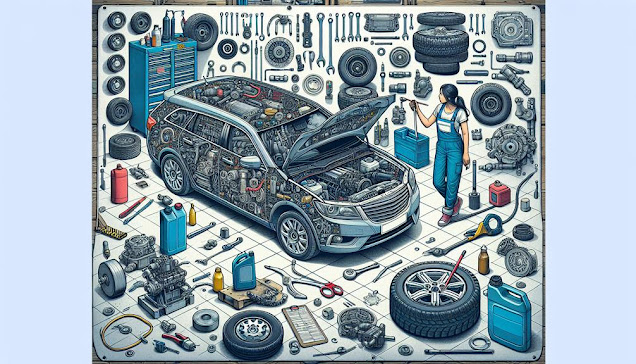Comprehensive Guide to Preventive Maintenance for Car Owners
Preventive maintenance is the foundation of responsible vehicle ownership, guaranteeing safety, reliability, and long-term savings. By following a structured maintenance plan—encompassing regular oil changes, air filter replacements, and diligent tire care—car owners can experience improved performance and extended vehicle lifespan. Staying aligned with manufacturer guidelines and leveraging digital tools to schedule tasks simplifies the process. But what additional practices and innovative strategies can enhance your approach to preventive maintenance and revolutionize your driving experience?
Essential Preventive Maintenance Tasks
Key preventive maintenance tasks are vital for keeping your vehicle running efficiently and avoiding costly repairs. These fundamental actions ensure that your car performs at its best while preventing premature wear.One of the most critical tasks is performing regular oil changes. Fresh oil minimizes engine friction, reduces wear, and eliminates harmful contaminants, ensuring the engine operates smoothly. Similarly, replacing the air filter is essential for maintaining efficient airflow to the engine, which boosts fuel economy and lowers emissions.
Tire maintenance is equally important. Checking tire pressure and tread depth regularly improves vehicle handling, enhances fuel efficiency, and ensures safety on the road.
Another vital task is inspecting and maintaining your brakes. Routine brake checks ensure your vehicle has the stopping power needed in critical moments, protecting passengers and the vehicle itself.
https://medium.com/@starautomotivellc123/10-essential-preventive-maintenance-tips-for-your-car-f76ee5cdc027
Driving conditions also play a significant role in shaping your maintenance plan. For instance, vehicles used in extreme weather conditions may require more frequent checks. In cold climates, monitoring antifreeze levels and battery performance is crucial, while in hot climates, tire pressure and coolant levels should be prioritized.
Digital tools and apps can simplify scheduling by tracking your car’s maintenance history and sending reminders for upcoming tasks. These resources not only keep you organized but also connect you with other car enthusiasts who share tips and best practices for your specific vehicle model.
Ultimately, preventive maintenance fosters a culture of responsibility and sustainability within the automotive community. It not only safeguards your investment but also instills a sense of security and accomplishment as you keep your vehicle in peak condition for years to come.
Creating a Preventive Maintenance Schedule
While completing maintenance tasks is essential, having a well-structured schedule is key to maintaining your vehicle’s health. Start by consulting the owner’s manual, which provides specific intervals for tasks like oil changes, tire rotations, and brake inspections. Following these manufacturer recommendations helps your car remain efficient and reliable over time.Driving conditions also play a significant role in shaping your maintenance plan. For instance, vehicles used in extreme weather conditions may require more frequent checks. In cold climates, monitoring antifreeze levels and battery performance is crucial, while in hot climates, tire pressure and coolant levels should be prioritized.
Digital tools and apps can simplify scheduling by tracking your car’s maintenance history and sending reminders for upcoming tasks. These resources not only keep you organized but also connect you with other car enthusiasts who share tips and best practices for your specific vehicle model.
The Importance of Preventive Maintenance
Some car owners may view preventive maintenance as time-consuming or costly, but its benefits far outweigh the perceived inconvenience. Staying proactive with regular maintenance prevents major repairs, enhances vehicle safety, and optimizes performance. By adhering to a structured plan and utilizing modern tools, car owners can manage tasks effectively and gain a deeper understanding of their vehicle’s mechanics.Ultimately, preventive maintenance fosters a culture of responsibility and sustainability within the automotive community. It not only safeguards your investment but also instills a sense of security and accomplishment as you keep your vehicle in peak condition for years to come.



Comments
Post a Comment